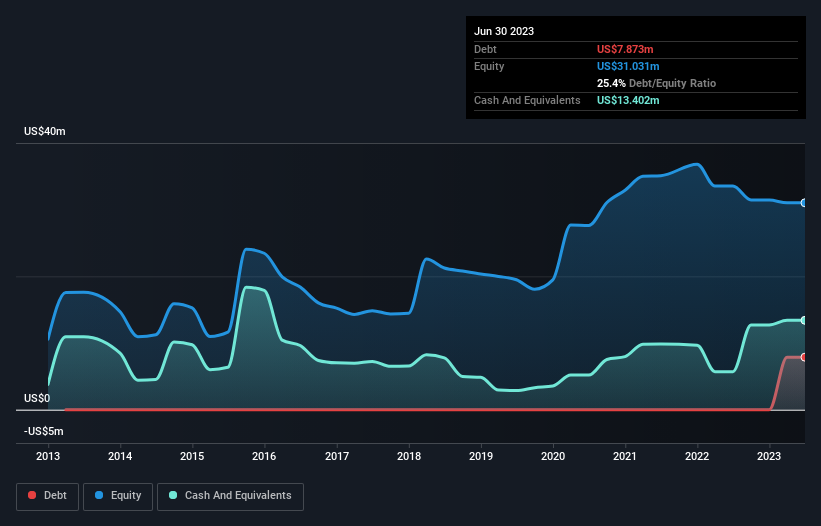Some say volatility, rather than debt, is the best way to think about risk as an investor, but Warren Buffett famously said that 'Volatility is far from synonymous with risk.' So it seems the smart money knows that debt - which is usually involved in bankruptcies - is a very important factor, when you assess how risky a company is. We can see that Bango PLC (LON:BGO) does use debt in its business. But should shareholders be worried about its use of debt?
Why Does Debt Bring Risk?
Debt is a tool to help businesses grow, but if a business is incapable of paying off its lenders, then it exists at their mercy. If things get really bad, the lenders can take control of the business. However, a more usual (but still expensive) situation is where a company must dilute shareholders at a cheap share price simply to get debt under control. Having said that, the most common situation is where a company manages its debt reasonably well - and to its own advantage. When we think about a company's use of debt, we first look at cash and debt together.
See our latest analysis for Bango
What Is Bango's Net Debt?
The image below, which you can click on for greater detail, shows that at June 2023 Bango had debt of US$7.87m, up from none in one year. But it also has US$13.4m in cash to offset that, meaning it has US$5.53m net cash.

How Strong Is Bango's Balance Sheet?
Zooming in on the latest balance sheet data, we can see that Bango had liabilities of US$27.9m due within 12 months and liabilities of US$10.8m due beyond that. On the other hand, it had cash of US$13.4m and US$15.4m worth of receivables due within a year. So its liabilities total US$9.96m more than the combination of its cash and short-term receivables.
Since publicly traded Bango shares are worth a total of US$178.2m, it seems unlikely that this level of liabilities would be a major threat. But there are sufficient liabilities that we would certainly recommend shareholders continue to monitor the balance sheet, going forward. While it does have liabilities worth noting, Bango also has more cash than debt, so we're pretty confident it can manage its debt safely. There's no doubt that we learn most about debt from the balance sheet. But ultimately the future profitability of the business will decide if Bango can strengthen its balance sheet over time. So if you're focused on the future you can check out this free report showing analyst profit forecasts.
In the last year Bango wasn't profitable at an EBIT level, but managed to grow its revenue by 76%, to US$38m. Shareholders probably have their fingers crossed that it can grow its way to profits.
So How Risky Is Bango?
Statistically speaking companies that lose money are riskier than those that make money. And the fact is that over the last twelve months Bango lost money at the earnings before interest and tax (EBIT) line. And over the same period it saw negative free cash outflow of US$9.0m and booked a US$5.9m accounting loss. But at least it has US$5.53m on the balance sheet to spend on growth, near-term. With very solid revenue growth in the last year, Bango may be on a path to profitability. Pre-profit companies are often risky, but they can also offer great rewards. For riskier companies like Bango I always like to keep an eye on whether insiders are buying or selling. So click here if you want to find out for yourself.
At the end of the day, it's often better to focus on companies that are free from net debt. You can access our special list of such companies (all with a track record of profit growth). It's free.
Mobile Infrastructure for Defense and Disaster
The next wave in robotics isn't humanoid. Its fully autonomous towers delivering 5G, ISR, and radar in under 30 minutes, anywhere.
Get the investor briefing before the next round of contracts
Sponsored On Behalf of CiTechValuation is complex, but we're here to simplify it.
Discover if Bango might be undervalued or overvalued with our detailed analysis, featuring fair value estimates, potential risks, dividends, insider trades, and its financial condition.
Access Free AnalysisHave feedback on this article? Concerned about the content? Get in touch with us directly. Alternatively, email editorial-team (at) simplywallst.com.
This article by Simply Wall St is general in nature. We provide commentary based on historical data and analyst forecasts only using an unbiased methodology and our articles are not intended to be financial advice. It does not constitute a recommendation to buy or sell any stock, and does not take account of your objectives, or your financial situation. We aim to bring you long-term focused analysis driven by fundamental data. Note that our analysis may not factor in the latest price-sensitive company announcements or qualitative material. Simply Wall St has no position in any stocks mentioned.
About AIM:BGO
Bango
Develops, markets, and sells technology that enables the marketing and sale of products and services to mobile phone users.
Undervalued with mediocre balance sheet.
Similar Companies
Market Insights
Weekly Picks

THE KINGDOM OF BROWN GOODS: WHY MGPI IS BEING CRUSHED BY INVENTORY & PRIMED FOR RESURRECTION


Why Vertical Aerospace (NYSE: EVTL) is Worth Possibly Over 13x its Current Price


The Quiet Giant That Became AI’s Power Grid
Recently Updated Narratives


MINISO's fair value is projected at 26.69 with an anticipated PE ratio shift of 20x


Fiverr International will transform the freelance industry with AI-powered growth

Stride Stock: Online Education Finds Its Second Act
Popular Narratives


MicroVision will explode future revenue by 380.37% with a vision towards success


Crazy Undervalued 42 Baggers Silver Play (Active & Running Mine)





